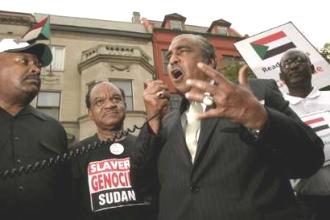US steps up push to halt Sudan violence

By Vicki Allen and Adam Entous
WASHINGTON, July 13 (Reuters) – U.S. Congress members on Tuesday sought to declare a “genocide” in Sudan’s Darfur region in hopes of spurring U.N. action, and U.S. President George W. Bush urged the Sudanese government to resolve the crisis.
“I call upon the government of Sudan to stop the Janjaweed violence. I call on all parties of the conflict to respect the cease-fire, to respect human rights, and to allow for the free movements of humanitarian workers and aid,” Bush told African ambassadors at a White House bill-signing ceremony.
His comments follow a State Department criticism on Monday that the Sudanese government has not done enough to end the violence.
Also on Tuesday, a bipartisan group of lawmakers pushed for the U.S. Congress to declare genocide is occurring in Darfur, a step they said would pressure the United Nations to take action to protect Africans in the region from Arab militias.
Marauding government-backed militias known as Janjaweed have put hundreds of thousands of people at risk of death from starvation or illness as the rainy season approaches, U.S. officials say.
“While the world debates about what we should do, people continue to die in Darfur. It is time to end the debate and start saving lives,” Sen. Sam Brownback, a Kansas Republican just back from Darfur, said at a news conference.
The United Nations has declared the situation in Darfur the world’s worst humanitarian crisis, as villages have been leveled and thousands of people have been killed or raped.
But it has stopped short of declaring a genocide, which under a 1948 convention would require U.N. action.
The resolution being pushed by U.S. lawmakers declares “that the atrocities unfolding in Darfur, Sudan are genocide.”
Rep. Donald Payne, a New Jersey Democrat, said the resolution “invokes a word that obligates the world to act … We have to isolate this government (of Sudan) and force it to do the right thing.”
At the United Nations, Security Council members are negotiating a U.S.-drafted resolution that would impose an arms and travel ban on militia leaders. The measure would give the Sudan government 30 days to implement pledges before it too faces possible sanctions.
But progress has been slow. Europeans have been supporting the United States but other members are hesitant to impose any further sanctions before Sudan has a chance to comply with international demands to stop the atrocities.
Sudan, which denies it backs the militia, has pledged to disarm the Janjaweed, remove them from areas near refugee camps and provide a police force for the border areas between Sudan and Chad, where tens of thousands have fled.
Brownback said the White House has not stated a position on the congressional resolution declaring genocide. The measure is seen has having a good chance of passing if it comes up for a vote, but the timing of any vote is unclear.
